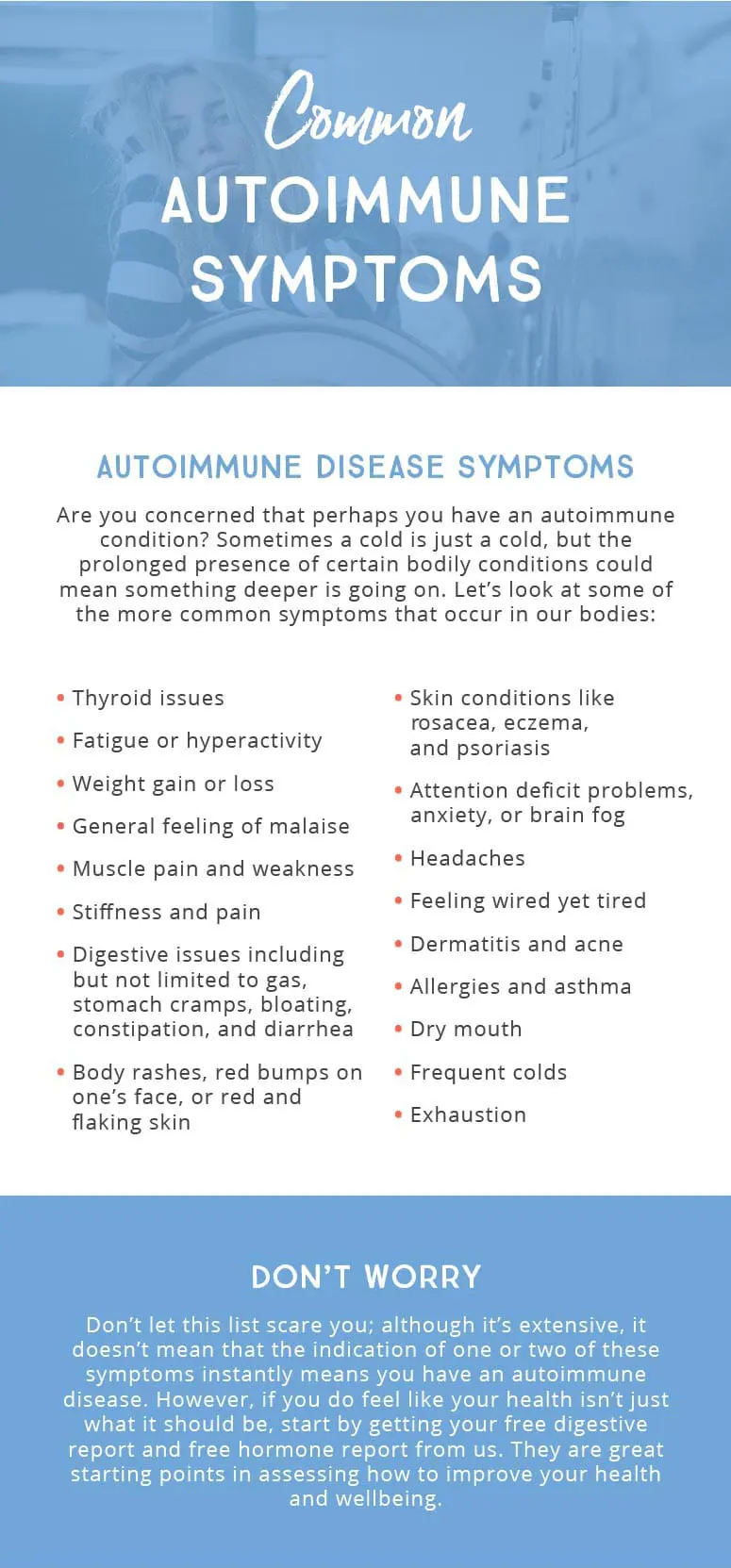Are You Developing An Autoimmune Disease? Common Symptoms To Keep In Mind in Lombard IL

Have you had odd symptoms that negatively affect your health, but they often seem to come and go? Or maybe suddenly you're experiencing reactions to certain foods that you never used to before, and you're left clueless as to why? It's possible that you could have an autoimmune disease, although actually diagnosing it as such can take many years. (1) Continue reading to learn more about what Lombard IL chiropractors know about Auto-Immune Diseases.
The time it takes to find out what's wrong is only part of the battle, as many people end up visiting multiple doctors before they can even narrow down the cause of their symptoms. On average, people see about six physicians before they actually gain clarity about their health. (2) Despite how common autoimmune diseases have become, physicians aren't quick to look in this direction, as they can be difficult to diagnose even after a variety of testing.
Unfortunately, many individuals are left in the dark, having to deal with symptoms that decrease their quality of life while struggling to find out what the cause might be. Today we're going to explore the common symptoms of autoimmune diseases, how you can treat them, and why you're not alone.
Autoimmune Disease Symptoms In Lombard IL
Are you concerned that perhaps you have an autoimmune condition but aren't really sure what's going on with your health? Sometimes a cold is just a cold, but the prolonged presence of certain bodily conditions could mean something deeper is going on. Let's look at some of the more common symptoms that occur in our bodies:
- Skin conditions like rosacea, eczema, and psoriasis
- Body rashes, red bumps on one's face, or red and flaking skin
- Headaches
- Digestive issues including but not limited to gas, stomach cramps, bloating, constipation, and diarrhea
- Dermatitis and acne
- Allergies and asthma
- Dry mouth
- Frequent colds
- Attention deficit problems, anxiety, or brain fog
- Thyroid issues
- Fatigue or hyperactivity
- Weight gain or loss
- A general feeling of malaise
- Muscle pain and weakness
- Stiffness and pain
- Feeling wired yet tired
- Exhaustion
Don't let this list scare you; although it's extensive, it doesn't mean that the indication of one or two of these symptoms instantly means you have an autoimmune disease. However, if you do feel like your health isn't just what it should be, start by getting your free digestive report and free hormone report from us. They are great starting points in assessing how to improve your health and wellbeing.

How Prevalent Are Autoimmune Diseases?
They aren't as widely talked about as cancer, and yet autoimmune disease is a widely spread condition throughout America. The American Autoimmune Related Diseases Association reports that over 50 million people are affected by one of 100 different conditions, with those numbers continuing to rise. (3)
Autoimmune diseases aren't harmless, as they are one of the top 10 causes of death in female children and women in any age group up to 64 years old. Between 2001 and 2009 alone, type 1 diabetes, considered to be an autoimmune disease, rose by 23%. (4) There's a definite genetic link that's been discovered as well, so if your parent has an autoimmune disease, there's a chance that you could develop one at some point in your lifetime.
One of the more common linkages in our anatomy that can help to identify and even prevent the onset of autoimmune disease has to do with gut-associated lymphoid tissue. The connection between digestive disorders, our immune system, and the structure of our gut play an important role in the ability of our bodies to function properly. (5)
The Link To Our Gut
It can't be emphasized enough how strong the connection is between our gut health and our overall wellbeing. While each individual autoimmune disease presents with its own set of symptoms and consequences, researchers are beginning to see a common thread between all of the diseases that occur: a leaky gut.
On a basic level, there are several factors that contribute to a leaky gut and thus the emergence of an autoimmune disease. (6) Our intestinal lining contains an epithelial barrier that keeps food in our digestive tract and away from the rest of our bodies. With the presence of our microbiome, a system of good bacteria that works to keep our gut healthy, our bodies are able to regulate immune functions properly.
A multitude of bacteria also help with this process, including an important one called Bacteroides fragilis. Present in most humans, b. fragilis aids in our intestinal anti-inflammatory function and acts almost like a referee of gut health. (7)
When things go wrong, our gut literally begins to leak, and our immune system treats these leakages as foreign invaders and begins to attack itself. Leaky gut is thought to contribute to some of these major autoimmune diseases:
- Inflammatory bowel disease
- Celiac disease
- Autoimmune hepatitis
- Type 1 diabetes
- Multiple sclerosis
- Lupus
Healing A Leaky Gut
Autoimmune diseases can be treated, and with a specific diet, may not interfere much with your daily life. Once you're armed with the knowledge about your condition and you can explain your symptoms, you're well on your way to managing an autoimmune disease.
But what about if you don't have a full-blown autoimmune disease yet, although you are concerned that you exhibit a symptom or two now? Since a leaky gut has been uncovered as the culprit of autoimmune diseases, healing your gut before things get worse may be the key to preserving your health.
A variety of treatments and lifestyle changes can be implemented to help heal a leaky gut, but remember to always consult a functional medicine specialist before starting any particular regiment. In general, several ways you might try to heal a leaky gut include: (8)
- Cutting back, or entirely eliminating, added sugars from your diet. One of the types of bacteria in our gut is called candida, and when it's fed an abundance of sugar, it can throw off the balance of the microbiome.
- Drink plenty of filtered water. The number of chemicals and toxins found in most tap water can harm the gut's environment, so make sure you stay hydrated with clean water.
- Both sleep deprivation and stress can have a negative effect on the bacteria in your gut, so utilize stress-relieving techniques and make sure to go to bed early enough each night to get a full 8 hours.
- Integrating probiotics into your diet can be a huge contribution to promoting health in the gut. Foods like yogurt, kombucha, or kimchi aid in boosting the good bacteria in your gut, helping to restore health and balance.
- Reducing known inflammatory foods can make a huge difference as well. Items like grains, dairy, or soy can all potentially trigger inflammatory responses in the body, so limiting or completely eliminating them from your diet might help.
Whether you currently have the symptoms of an autoimmune disease, have been diagnosed with one, or just want to improve the health of your gut before it's too late, BrightLife Clinic - Lombard can help. We utilize a whole-body approach when it comes to health, and can provide the support you need to heal a leaky gut or live a more enjoyable life despite having an autoimmune disease.
If you're ready to get help with your health, contact us today to schedule an appointment.

OFFICE HOURS
Monday
9:00am - 6:00pm
Tuesday
2:00pm - 6:00pm
Wednesday
9:00am - 6:00pm
Thursday
2:00pm - 6:00pm
Friday
9:00am - 1:00pm
Saturday
9:00am - 12:00pm
Sunday
Closed
BrightLife Clinic - Lombard
442 E Roosevelt Rd
Lombard, IL 60148




